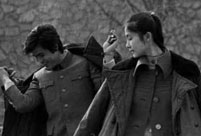Liu Weibing, a senior photographer and a guest professor at the School of Journalism of Renmin University of China (RUC), is an old friend of mine though he is many years my junior. Here is his new book Stories of China’s Reform – a Photographer’s Personal Experiences, which I read at one sitting. The book is so dear to me – and also so new to me even though I am familiar with many events cited in it. China has changed with each passing day since it launched the reform some 30 years ago. And never has life in the country been so lively and full of vigor like today. Basing himself on a wealth of experiences he has acquired through work as a photographer at Xinhua, the State news agency, Weibing has written candidly to provide a true-to-life account of those epic changes.
I experienced numerous events cited in the book. I was able to go to school only after New China’s birth in 1949. Never had I dreamed that I would be able to stand on Tiananmen Rostrum watching the military and civilian parades marking New China’s 60th founding anniversary on October 1, 2009. With tears in my eyes, I saw the characters reading “Long live the people” formed by students in Tiananmen Square using flowers in their hands. I was deputy head of the Chinese delegation to the 1995 World Conference on Women and I was on the Beijing Bidding Committee for the 2008 Olympic Games. I was involved in the negotiations on Hong Kong’s return to China, in the negotiations on China’s accession to the World Trade Organization and in the rescue and relief operations after the 2008 Wenchuan earthquake.
Despite my personal experiences in those events, I feel Weibing’s narratives and photos new to me. I was at Shatoujiao announcing China’s takeover of the Kowloon Customs on authorization of the Central Government at zero hour of July 1, 1997, a moment of nationwide jubilation for resumption of China’s exercise of sovereignty over Hong Kong. Despite that, I have found things new in Weibing’s comparison between Border Street and Silk Alley, a business street in Beijing, which he does by transcending time and space and using plain language.
As deputy head of the Chinese delegation to the 1995 World Conference on Women, I was able to listen to speeches delivered by delegates from various countries. Weibing’s new book, which I read 18 years after the Conference, tells me many things of which I had no idea as a leader of the Chinese delegation – his amiable encounter with some African delegates, those “surprising discoveries” he made at Huairou, venue for the Conference’s non-governmental forum. Just for one thing: the Chinese delegates were customarily reserved, busy taking notes while a leader of theirs was reading from a text in all seriousness on the rostrum, in contrast to foreign delegates who were vivacious and bold, never hesitating to air their views. I was impressed by Weibing’s interpretation of those events, Chinese and foreign, bygone and of today, which I found profound in meaning. The book tells about the progress Beijing has made, for example the transformation of Longxugou, once a notorious slum area, into what is now Longtan Park. Meanwhile, it provides a vivid account of the smog that shrouded the Chinese capital for days on end in early 2013, making “environmental protection” household words. Here is the author’s conclusion: “Only by being friendly to environment can people enjoy an environment friendly to them.” It falls in line with the call of the Chinese government for attaching paramount importance to people’s livelihood and to attainment of sustainable development.
Another example is the book’s account of migrant workers in Beijing. The author, full of sympathy toward them, uses a host of facts to highlight their role in promoting the development of cities and improving life of city people. Meanwhile, he is relentlessly scornful of those “swollen with arrogance” toward migrant workers, those “holding a brief case in hand,” “with a conspicuously extruding beer belly.” Basing himself on his own observation, the author notes that city people of today may well be descendent of peasants or migrant workers. And proceeding from that, he dwells on some ups and downs experienced by foreign countries in the course of their development and pinpoints what China can learn from them. I believe the book is of both historic and practical significance. It throws light on the road we have followed and helps us in our understanding of the path we are to follow. It makes us proud of the progress we have made while alerting us to the need not to be self-complacent, so that we’ll be more resolved and confident in our march toward the future.
Li Zhaoxing was China’s foreign minister 2003-2007. He is the current president of China Public Diplomacy Association.
 Heavy cargo flights taking off
Heavy cargo flights taking off In pictures: PLA's digital equipment
In pictures: PLA's digital equipment  Americans mark Thanksgiving Day with parades
Americans mark Thanksgiving Day with parades Love searching stories in cities
Love searching stories in cities  Shanghai shrouded in heavy fog
Shanghai shrouded in heavy fog Office ladies receive ‘devil’ training in mud
Office ladies receive ‘devil’ training in mud Changes in Chinese dancing culture
Changes in Chinese dancing culture  Highlight of Mr Bodybuilding and Miss Bikini Contest
Highlight of Mr Bodybuilding and Miss Bikini Contest  Picturesque scenery of Huanglong, NW China
Picturesque scenery of Huanglong, NW China Life in an ancient academy
Life in an ancient academy Best photos of the week
Best photos of the week Spring City Kunming witnesses snowfall
Spring City Kunming witnesses snowfall White-collars, black eyes
White-collars, black eyes China's moon rover, lander photograph each other
China's moon rover, lander photograph each other Youths in Night club: photo story
Youths in Night club: photo storyDay|Week|Month